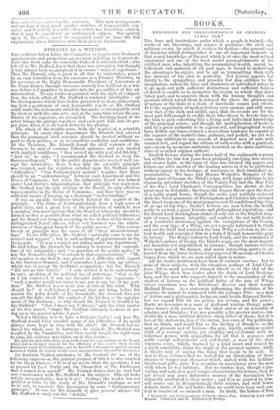DISRAELI AS A WITNESS.
THE evidence taken before the Committee to inquire into Dockyard appointments and promotions grows more relishing as it proceeds. First this week came the venerable Duke of Northumberland ; who left all to Mr. Stafford, knew that there was corruption but thought it had always been so, and pleaded in excuse" want of experience." Then Mr. Disraeli, who is great in all that he undertakes, passed by an easy transition from his successes as a Finance Minister, to Ins successes as the Right Honourable President of Literature at the Fund dinner, through successes scarcely less brilliant as a wit- ness before a Committee to inquire into the peccadilloes of his ad- ministration. To any reader acquainted with his style of composi- tion, the whole affair of Mr. Stafford is rendered intelligible : all the discrepancies which have before prevented us from understand- ing how a gentleman of such honourable repute as Mr. Stafford could make the statements which he has made, so incompatible with the facts or with his own acts, and at the same time retain the con- fidence of his superiors, are reconciled. The finishing-hand of the artist brings the picture together, and each part falls into its pro- per place when it is all toned down by his glazing. The whole of the trouble arose from the neglect of a scientific principle. In every other department Mr. Disraeli had advised that the permanent civil servants should be treated without re- gard to their politics, so as to conciliate cordiality and confidence. At the Treasury, Mr. Disraeli found the civil servants of the Crown to be men of extreme Liberal opinions' and yet, treated with implicit confidence, "they served me with zeal and fidelity." "And so," he adds, "I recommended Mr. Stafford to treat the Surveyor-General." All the public departments worked well ex- cept the Admiralty ; there it was that the scientific principle was violated, and the violation entailed upon Mr. Stafford great "difficulties." "Our Parliamentary system" requires that there should be an "understanding" between each department and the House of Commons ; but when the Admiralty Board was formed under Lord Derby's Administration, that principle was neglected. Mr. Stafford was the only civilian at the Board, its only effective representative in the House of Commons ; and thus there was no sufficient means of keeping up a thorough "understanding." It was an amiable weakness which dictated the neglect of the principle. "The Duke of Northumberland, from a high sense of public duty, and a great love of the profession of which he was a member, was most anxious that the Board of Admiralty should be formed as free as possible from what are called political influences ; and the Board was formed, according to the wishes of his Grace, of distinguished Naval officers, whose sole business was the admin- istration of that great branch of the public service." This serious breach of principle was the cause of all "these misunderstand- ings." In his difficulties, Mr. Stafford "naturally came to me for counsel and support" ; but he said nothing of appointments in the Dockyards. "It was a subject not falling under my department." He laid before Mr. Disraeli the tendency to increase the expendi- ture of the Admiralty ; and, "as guardian of the public purse," it was Mr. Disraeli's duty "to attend to that representation." "Re did mention to rue that he was placed in a difficulty with regard to the Surveyor-General, and I remember I gave him my advice ; which was to accept Sir Baldwin's resignation: but Mr. Disraeli "did not go into details." "I only wished it to be understood," he says, speaking of the political use of patronage, "that so far as I am concerned it was not brought under my cognizance "; "such a matter would not occur to me, nor to any one in my posi- tion." Mr. Stafford never went into details of this kind. Why should he ? A well-behaved servant does not bring before his master the petty details of his household; the steward does not consult the duke about the conduct of the kitchen or the appoint- ment of the dustman ; so why should Mr. Disraeli be troubled by his Stafford? "But I must say, I always," adds the kind master of his free accord, "found Mr. Stafford extremely desirous of act- ing upon the general advice I gave." What a blessing it is to have a first-rate leader ! and how Mr. Stafford would have avoided many of his difficulties if be could always have kept in tune with his chief ! Mr. Disraeli had re- duced the whole case to harmony ; he retired ; Mr. Stafford was recalled by the Committee, and then, newly taught the right tune to sing, his evidence was taken up in this strain— He said his first difficulties arose from being the only civilian at the Board, which had a stronger regard for the efficiency of the service than for the Estimates voted by Parliament ; and he had felt it his duty to protest against measures which, he feared, would cause an expenditure beyond the Estimates.
Sir Baldwin Walker attributes to Mr. Stafford the use of the following expression, the general purport of which is also vouched by Sir Hyde Parker—" It is of no use to blink the question ; I am so pressed by Lord Derby and the Chancellor of the Exchequer that I cannot help myself." Mr. Disraeli denies that he ever had any conversation with Mr. Stafford on the subject. This all looks totally irreconcileable ; but is it so ? Perhaps the reader has not profited so little by the study of Mr. Disraeli's evidence as not to be able to reconcile this discrepancy by some "Parliamentary principle." It was for Mr. Disraeli to give general advice—for Mr. Stafford to carry out the "details."


























 Previous page
Previous page